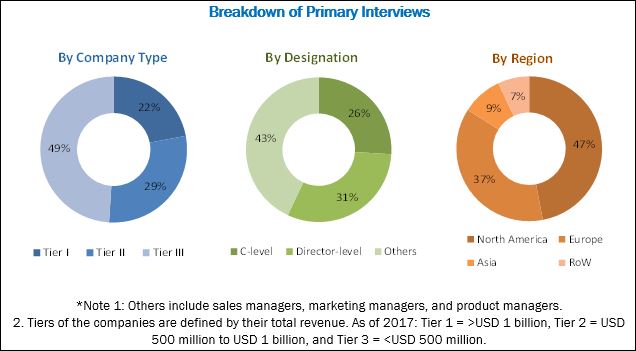The ophthalmology PACS market is projected to reach USD 160.2 million by 2023 from an estimated USD 101.0 million in 2017, at a CAGR of 8.5% during the forecast period. The base year considered for the study is 2017 and the forecast period is from 2018 to 2023.
Drivers
The ophthalmology PACS market is projected to reach USD 160.2 million by 2023 from an estimated USD 101.0 million in 2017, at a CAGR of 8.5% during the forecast period. The base year considered for the study is 2017 and the forecast period is from 2018 to 2023.
Drivers1. Rapid growth in the geriatric population
Download FREE Brochure @
https://www.marketsandmarkets.com/pdfdownload.asp?id=130879968
2. Rising prevalence of eye diseases
Download FREE Brochure @
https://www.marketsandmarkets.com/pdfdownload.asp?id=130879968
The number of
people with major eye diseases is increasing across the globe, and vision loss
is becoming a major public health concern. The growth in aging population and
the increasing prevalence of chronic disorders such as diabetes and
hypertension have also served to boost the prevalence of eye diseases such as
diabetic retinopathy and ocular hypertension (glaucoma). The number of blind
individuals or those affected with low vision is expected to increase
substantially.
According to the
Royal National Institute of Blind People (RNIB), in 2013, around 2 million
people in the UK were living with sight loss, which is expected to increase to 4.1 million by 2050.
According to
the WHO, an estimated 20 million cataract surgeries were performed in 2010
across the globe; this is expected to reach 32 million by 2020.
Restraints
1 High implementation and maintenance costs
Overcoming
financial constraints is the biggest challenge for healthcare organizations,
especially in emerging economies. The high cost of imaging equipment and the implementation
and licensing of software form a major factor restraining market growth, particularly
in countries where the reimbursement scenario is poor.
Most healthcare
facilities in developing countries cannot afford these systems due to their
high installation and maintenance costs. Ophthalmology PACS, being a novel
technology, is costly compared to radiology or cardiology PACS.
Opportunities
1 Untapped emerging markets
With their huge
population base, developing countries across the world, including China, India,
Russia, Brazil, Mexico, and South Africa, pose potential growth opportunities
for ophthalmology PACS providers. More than half the world’s population resides
in India and China, accounting for a large patient base. According to the UN
Economic and Social Affairs 2017 Report, the population of people aged over 60
years in Asia is expected to increase by ~131.8% from 2017 to 2050, which will
consequently drive the prevalence of age-related eye diseases in the region.
2 Integration with EHR/EMR
Managing the entire
spectrum of healthcare content across healthcare enterprises is the basis for
achieving a broader HCIT strategy. The concept of medical image management
originated with PACS, starting with specific solutions for the radiology
department which slowly seeped into other specialties like ophthalmology. PACS,
when integrated with EHR, provides instant access and the ability to review
images and diagnostic reports with all the necessary image enhancement and
advanced review tools.
Challenges
1. Poor compatibility with informatics standards
In order to manage previously
gathered data, film photography or manually recorded observations are now being
digitized. Although most ophthalmic imaging device vendors provide at least a
DICOM post-processed image or graphical report option, some smaller vendors may
only provide post-processed images in PDF, TIFF, Extensible Markup Language
(XML), or another format.
Expansions (2015–2018)
Month & Year
|
Company
|
Country
|
Description
|
February 2018
|
Carl Zeiss Meditec AG
|
Asunción,
Paraguay |
ZEISS and Christoffel-Blindenmission (CBM) along with
local partner Fundación Visión established a training center for
ophthalmologists. This center utilizes all the equipment and solutions
developed by ZEISS for ophthalmology diagnosis and treatment.
|
September 2017
|
Carl Zeiss Meditec AG
|
Germany
|
The company invested USD 36.1 million (EURO 30 million) in
an innovation hub at the Karlsruhe Institute of Technology (KIT), Germany, to
build new technologies in the ophthalmic industry.
|
Mergers and Acquisitions (2015–2018)
Month & Year
|
Strategy
|
Acquirer
|
Acquiree
|
Description
|
April 2018
|
Acquisition
|
Topcon Corporation
|
KIDE Clinical Systems Oy (Finland)
|
This acquisition enabled the company to enhance its
ophthalmology product segment by adding KIDE’s optical and ophthalmology
cloud solutions to its product portfolio.
|
August 2017
|
Acquisition
|
Carl Zeiss Meditec AG
|
Veracity Innovations, LLC (US)
|
To focus on advancing digitalization in medical technology
by expanding its market-leading digital solutions for eye care with the
acquisition of an intelligent cloud-based platform offered by Veracity, which
provides doctors fast and easy access to relevant clinical data at each step
in the care and treatment of patients.
|
Product Launches and enhancements (2015–2018)
Year
|
Company
|
Segment
|
Product
|
November 2017
|
Carl Zeiss
Meditec AG
|
Ophthalmology
and Optometry
|
The
company launched its VERACITY Surgical, Clarus 500, and HFA3.
|
October 2016
|
Topcon Corporation
|
Eye Care
|
IMAGEnet Connect
|








Thanks, for the post i think you missed in ophthalmic drug & devices like... http://bit.ly/global-healthcare-market
ReplyDelete